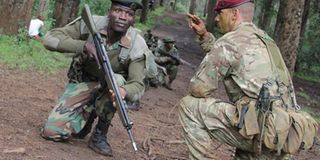Breaking News: At least 10 feared to have drowned in Makueni river
UK-Kenya talks to end duel on military camps

A British Army corporal instructs rangers from the Kenya Wildlife Service and Kenya Forest Service during an anti-poaching training exercise on December 5, 2013. FILE PHOTO | JOSEPH KANYI |
What you need to know:
- Current pact ends April.
- Thorny matters on training bases have strained decades-old ties between Nairobi and London.
Kenyan and British officials are to hold high-level discussions on a stalemate over British military training programmes in the country, whose current phase lapses in April.
The make-or-break talks are due in a “few days” to address the matter that has threatened decades-old military ties between the two countries.
Issues that have caused the deadlock include failure to agree on which of the two countries holds jurisdiction to prosecute British soldiers who may break the law while training in Kenya.
The UK is seeking immunity for its soldiers on Kenyan soil so that those who break the law are transported to Britain for prosecution, while Kenya wants them to face charges in local courts.
The current pact in which the British Army trains in parts of Laikipia and Samburu counties ends in April, but Kenya has not granted an extension.
Defence Principal Secretary Mutea Iringo addressed the issue when he met British government officials and business executives at Norfolk Hotel, Nairobi, last Wednesday.
“As you are aware, UK and the Government of Kenya have been negotiating a new bilateral pact to renew training by the British Army Unit. The talks, which have taken a while, mainly due to provisions in our new constitution, have fortunately come to a fruitful conclusion. We shall be meeting in the next few days to finalise the matter,” he said.
Many other discussions have taken place in the past. Since 1963, Kenya has always renewed the bilateral agreements without much noise.
The British delegation included UK Trade & Investment and Defence and Security Trade Missions to Kenya.
The delegation represented 17 UK firms involved in defence and security which are interested in doing business in Kenya.
NEED FOR CLOSE CO-OPERATION
Mr Iringo told them not to engage in business without consulting the government so as to avoid selling equipment and services to firms with links to criminals.
“While appreciating the support given in the fight against terrorism, there is a need to ensure close co-operation in identification of local civil societies and other groups to avoid inadvertent support of (terrorist) sympathisers,” he said.
The PS also called for suspension of travel advisories to Kenya by the British Government and other development partners “as the advisories have impacted negatively on the economy. Terrorism is a global threat and calls for teamwork and concerted efforts to counter”.
Regarding the training pact, in the past the Kenya police has investigated British Army personnel for crimes committed in the country.
For instance, in April 2013, police in Nairobi were investigating British officer John Beigeon on allegations he assaulted a police officer based in Runda and threated to stab his guard.
The case was forwarded to the Foreign Affairs ministry.
Last November, Kenya and the UK traded accusations over an incident in which a four-year-old boy was seriously injured by unexploded munition in Samburu County.
In 2012, a quarrel among British troops at a Nanyuki hotel degenerated into a fight between Irish and Scottish soldiers, prompting a police investigation as hotel management had become involved.




